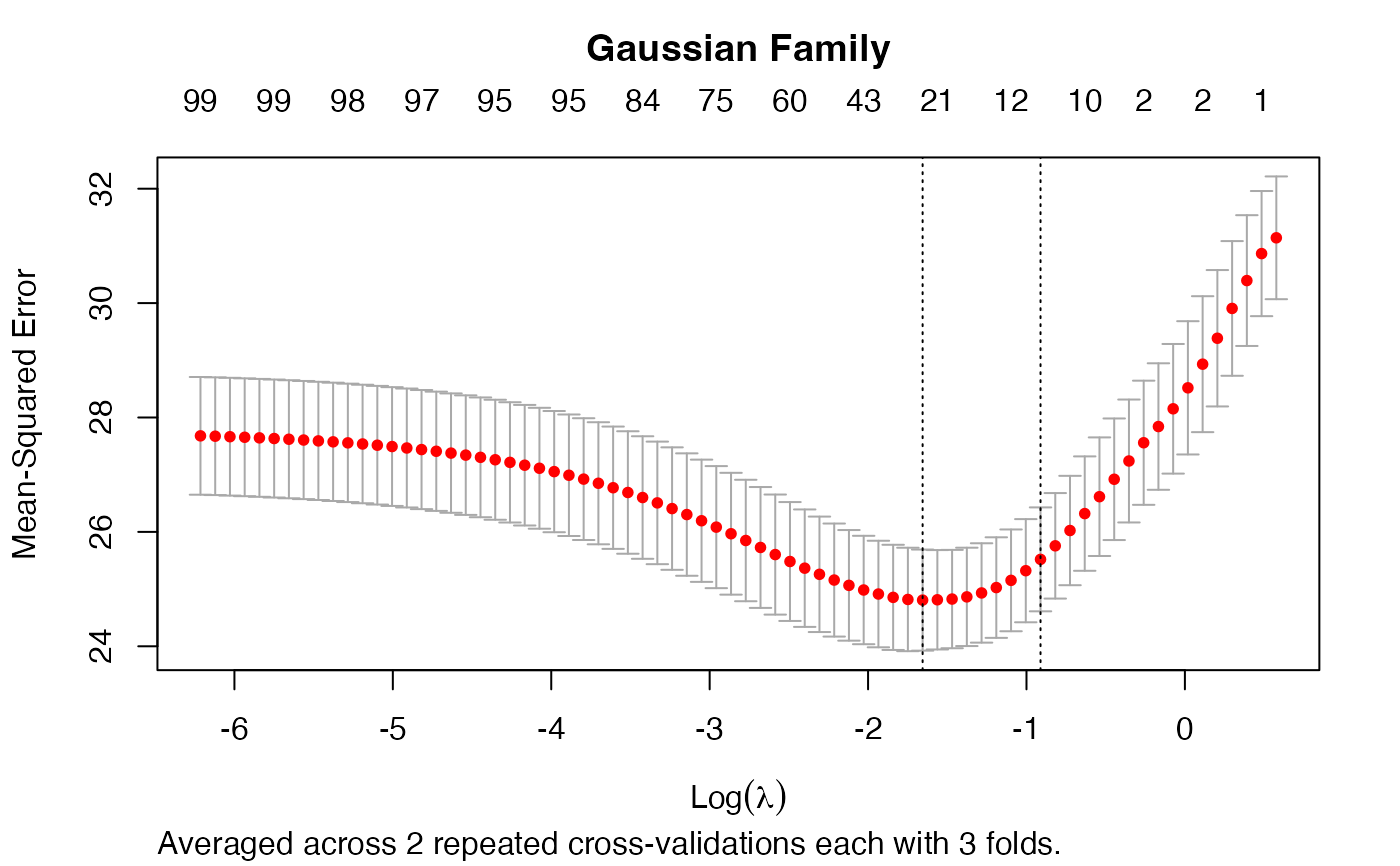This functions returns the best lambda of repeated glmnet::cv.glmnet()
calls.
rcv.glmnet(
x, y,
lambda = NULL, alpha = 1,
nrepcv = 100L, nfolds = 10L, foldid = NULL, balanced = FALSE,
...,
trace.it = interactive()
)Arguments
- x
matrix, as incv.glmnet.- y
response as in
cv.glmnet.- lambda
numeric, optional user-supplied lambda sequence; default isNULLandglmnetchooses its own sequence.- alpha
numeric(1), the elasticnet mixing parameter, default is1(lasso penality); seeglmnet::glmnet()for details.- nrepcv
integer(1), number of repeated cross-validations (outer loop).- nfolds
integer, number of folds, same as incv.glmnet.- foldid
matrix, an optional matrix withnrepcvrows andnrow(x)columns containing ids from 1 tonfoldsidentifying what fold each observation is in. If givennrepcvandnfoldsare ignored.- balanced
logical, should classes/status be balanced in the folds (default: FALSE)?- ...
further arguments passed to
cv.glmnet.- trace.it
integer, iftrace.it = 1, then a progress bar is displayed.
Value
An object of class rcv.glmnet that extends the cv.glmnet
class.
References
Jerome Friedman, Trevor Hastie, Robert Tibshirani (2010). Regularization Paths for Generalized Linear Models via Coordinate Descent. Journal of Statistical Software, 33(1), 1-22. URL https://www.jstatsoft.org/v33/i01/.
Noah Simon, Jerome Friedman, Trevor Hastie, Rob Tibshirani (2011). Regularization Paths for Cox's Proportional Hazards Model via Coordinate Descent. Journal of Statistical Software, 39(5), 1-13. URL https://www.jstatsoft.org/v39/i05/.
See also
Examples
# Examples taken from ?"glmnet::cv.glmnet"
set.seed(1010)
n <- 1000
p <- 100
nzc <- trunc(p/10)
x <- matrix(rnorm(n * p), n, p)
beta <- rnorm(nzc)
fx <- x[, seq(nzc)] %*% beta
eps <- rnorm(n) * 5
y <- drop(fx + eps)
set.seed(1011)
# nrepcv should usually be higher but to keep the runtime of the example low
# we choose 2 here
rcvob <- rcv.glmnet(x, y, nrepcv = 2, nfolds = 3)
plot(rcvob)
title("Gaussian Family", line = 2.5)
 coef(rcvob)
#> 101 x 1 sparse Matrix of class "dgCMatrix"
#> s1
#> (Intercept) -0.1162737
#> V1 -0.2171531
#> V2 0.3237422
#> V3 .
#> V4 -0.2190339
#> V5 -0.1856601
#> V6 0.2530652
#> V7 0.1874832
#> V8 -1.3574323
#> V9 1.0162046
#> V10 0.1558299
#> V11 .
#> V12 .
#> V13 .
#> V14 .
#> V15 .
#> V16 .
#> V17 .
#> V18 .
#> V19 .
#> V20 .
#> V21 .
#> V22 .
#> V23 .
#> V24 .
#> V25 .
#> V26 .
#> V27 .
#> V28 .
#> V29 .
#> V30 .
#> V31 .
#> V32 .
#> V33 .
#> V34 .
#> V35 .
#> V36 .
#> V37 .
#> V38 .
#> V39 .
#> V40 .
#> V41 .
#> V42 .
#> V43 .
#> V44 .
#> V45 .
#> V46 .
#> V47 .
#> V48 .
#> V49 .
#> V50 .
#> V51 .
#> V52 .
#> V53 .
#> V54 .
#> V55 .
#> V56 .
#> V57 .
#> V58 .
#> V59 .
#> V60 .
#> V61 .
#> V62 .
#> V63 .
#> V64 .
#> V65 .
#> V66 .
#> V67 .
#> V68 .
#> V69 .
#> V70 .
#> V71 .
#> V72 .
#> V73 .
#> V74 .
#> V75 -0.1420966
#> V76 .
#> V77 .
#> V78 .
#> V79 .
#> V80 .
#> V81 .
#> V82 .
#> V83 .
#> V84 .
#> V85 .
#> V86 .
#> V87 .
#> V88 .
#> V89 .
#> V90 .
#> V91 .
#> V92 .
#> V93 .
#> V94 .
#> V95 .
#> V96 .
#> V97 .
#> V98 .
#> V99 .
#> V100 .
predict(rcvob, newx = x[1:5, ], s = "lambda.min")
#> lambda.min
#> [1,] -1.3447658
#> [2,] 0.9443441
#> [3,] 0.6989746
#> [4,] 1.8698290
#> [5,] -4.7372693
coef(rcvob)
#> 101 x 1 sparse Matrix of class "dgCMatrix"
#> s1
#> (Intercept) -0.1162737
#> V1 -0.2171531
#> V2 0.3237422
#> V3 .
#> V4 -0.2190339
#> V5 -0.1856601
#> V6 0.2530652
#> V7 0.1874832
#> V8 -1.3574323
#> V9 1.0162046
#> V10 0.1558299
#> V11 .
#> V12 .
#> V13 .
#> V14 .
#> V15 .
#> V16 .
#> V17 .
#> V18 .
#> V19 .
#> V20 .
#> V21 .
#> V22 .
#> V23 .
#> V24 .
#> V25 .
#> V26 .
#> V27 .
#> V28 .
#> V29 .
#> V30 .
#> V31 .
#> V32 .
#> V33 .
#> V34 .
#> V35 .
#> V36 .
#> V37 .
#> V38 .
#> V39 .
#> V40 .
#> V41 .
#> V42 .
#> V43 .
#> V44 .
#> V45 .
#> V46 .
#> V47 .
#> V48 .
#> V49 .
#> V50 .
#> V51 .
#> V52 .
#> V53 .
#> V54 .
#> V55 .
#> V56 .
#> V57 .
#> V58 .
#> V59 .
#> V60 .
#> V61 .
#> V62 .
#> V63 .
#> V64 .
#> V65 .
#> V66 .
#> V67 .
#> V68 .
#> V69 .
#> V70 .
#> V71 .
#> V72 .
#> V73 .
#> V74 .
#> V75 -0.1420966
#> V76 .
#> V77 .
#> V78 .
#> V79 .
#> V80 .
#> V81 .
#> V82 .
#> V83 .
#> V84 .
#> V85 .
#> V86 .
#> V87 .
#> V88 .
#> V89 .
#> V90 .
#> V91 .
#> V92 .
#> V93 .
#> V94 .
#> V95 .
#> V96 .
#> V97 .
#> V98 .
#> V99 .
#> V100 .
predict(rcvob, newx = x[1:5, ], s = "lambda.min")
#> lambda.min
#> [1,] -1.3447658
#> [2,] 0.9443441
#> [3,] 0.6989746
#> [4,] 1.8698290
#> [5,] -4.7372693